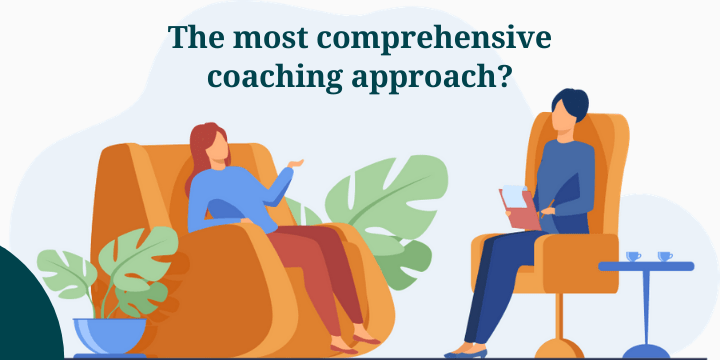The most comprehensive approach to Coaching
In life coaching, there are many models to help a client achieve an outcome. You have probably heard of the GOW, TGROW, and OSKAR models. Each model focuses on defining the outcome, defining the client’s current position vis-a-vis the outcome and creating an action plan to reach the outcome. The coach generally acts as an accountability partner and motivates the client to take each step, gradually moving towards the desired outcome.
However, anyone who has ever tried to create a change, develop a new habit or achieve a goal knows that it is not a lack of vision, action plan or motivation that truly stops us from making the change.
Let us understand this with an example.

We are sure you have, at least once in your life, set an alarm to wake up early in the morning. Haven’t you? But when the alarm rings at the said time, we either hit snooze or off and continue sleeping.
So, what happened?
Setting an alarm indicates that you have the conscious awareness, desire and motivation to wake up early. (the reasons could vary – to study, exercise, to write a blog etc.).
However, when the alarm rings, it is as if someone literally takes your hand and makes you press snooze or off. And this action usually follows an automatic thought that pops up in your head, like “10 minutes more,” or “I’ll start from tomorrow,” or an automatic feeling of lethargy.
Sounds familiar?
And for those of us who do wake up with the alarm, it is either very tiring or too much effort. And many of us give up after a while or go back to the old routine of waking up late.
And you are not alone. Millions of people go through something similar every day!
And this is the challenge with standard life coaching models.
While clients want to change and are able to define an outcome and design an action plan for achieving it, they are not able to take those actions consistently because of such hindrances.
The above example illustrates how automatic thoughts and emotions may hinder the client from taking necessary and consistent actions to reach the outcome. But that’s not all. These hindrances may also lie at a level deeper than this.
But before we talk about that, let’s understand where these hindrances are coming from.
As you are reading this article, do you have to consciously tell yourself to breathe or tell your body to digest the last meal you had?
No, right?
There is something within us that is responsible for carrying out these automatic or involuntary functions on its own, almost on autopilot. Since we are not doing it consciously, it would only be fair to call this regulating unit the UNCONSCIOUS MIND.
Recall the morning alarm example once. The “10 minutes more” thought or the feeling of lethargy was also automatic and spontaneous, right? That means it is the unconscious that is creating those thoughts and emotions. And if the unconscious is creating those thoughts and emotions, it is a no-brainer to say that in order to wake up early naturally and effortlessly, we need to change those unconscious thoughts and emotions first!
And these unconscious hindrances are not limited to thoughts and emotions. In many cases, these thoughts and emotions are themselves being driven by underlying unconscious beliefs, values and positive intentions. They need to be identified and resolved too.
So, a perfect life coaching model would be one that not only helps clients define outcomes and design action plans but also overcome these unconscious hindrances that prevent them from executing the action plans and achieving their outcomes.
This is where Cognitive Hypnotic Coaching comes in.
Frequently Asked Questions from life coaches
What is Cognitive Hypnotic Coaching®?
It is a comprehensive coaching model that seamlessly integrates –
- SOFTSEA™ coaching framework
- Different approaches in Psychology (Cognitive, Behavioural, Humanistic)
- Trance-formational Techniques from
- Classical Hypnosis
- Conversational Hypnosis
- Neuro Linguistic Programming
- Emotional Intelligence
- Metaphors and Stories
- Mindfulness
This comprehensive framework allows Cognitive Hypnotic coaches to help the client create sustainable, observable, measurable change, with minimal risk of relapse.
In short, it is the most comprehensive course for aspiring and existing coaches looking at developing advanced coaching skills.
Now that you have read this, we are sure you have several questions running through your minds right now. So, read on for the answers and if you still have any, reach out to us and we would love to answer all your questions and have a discussion over this.
How will Cognitive Hypnotic Coaching® make me an effective coach?
Cognitive Hypnotic Coaching enables you to help the client –

- Define the current situation or reality
- Define the outcome precisely
- Design a sensory-specific, observable future life that they wish to live
- Create an executable plan of action
- Identify conscious and unconscious hindrances
- Get clarity on the next steps if the hindrances are lack of resources and skills
- Restructure hindering thoughts to enabling thoughts
- Recondition hindering emotions to effective emotions
- Identify deeper issues that prevent change
- Change underlying beliefs and create more empowering beliefs
- Resolve value conflicts
- Address positive intentions to change behaviours
- Create change at all neurological levels
And since you will be able to do all this at the unconscious level, the client can experience natural, effortless and sustainable change!
During the training, you –

- Experience a series of personal breakthroughs that leads to a transformation in your own life. Your personal growth during training and mentoring enables you to help your clients transform their own lives, as you develop –
- Confidence
- Empathy
- Unconditional positive regard
- Compassion
- Patience
- Non-judgemental attitude
- Flexibility
- Creativity
- Learn to create transformation in your clients’ lives by developing all coaching competencies –
- Meeting Ethical Guidelines and Professional Standards
- Establishing the Therapeutic Agreement
- Using Structured yet Flexible Client-Centered Approach
- Managing self and maintaining a therapeutic presence
- Establishing a trust-based relationship with the client
- Engaged Listening
- Powerful Questioning
- Effective Communication
- Raising Awareness & Insights
- Inviting the possibility
- Ecological Goal Setting
- Designing Actions
- Overcoming Conscious and Unconscious Hindrances
- Managing Progress and Accountability
- Learn to build a coaching practice and generate clients to create a financially and emotionally fulfilling career. You learn –
- Core principles of brand building
- Time-tested strategies to generate clients
- Creating a customized branding strategy
- Breaking the strategy into actionable chunks
Do I need a background in Psychology to practice as a Cognitive Hypnotic Life Coach?
This approach has been designed in a step-by-step, structured format that you can easily and effectively apply with your clients. However, it remains flexible enough to be customized to individual clients.
I already have a life coaching certification. Is Cognitive Hypnotic Coaching® for me?
While you will master all the skills and competencies needed to help the clients achieve desired goals without an internal conflict, any other models or learnings you already have can be easily incorporated into the Cognitive Hypnotic Coaching framework.
How do I become a Cognitive Hypnotic Coach®?
To get more details about the process to become a Cognitive Hypnotic Coach, visit the Cognitive Hypnotic Coaching® Diploma page
Cognitive Hypnotic Coaching Case Studies
Anna is a friend of mine and we agreed upon and fixed a mutually convenient time for our Initial Consultation / Discovery Call after she confided in me about her recurrent spells of feeling under confident and incapable. Overcoming Self-Doubt
I recently received a call from a client, whom I’ll refer to as Akshay, seeking guidance for his weight loss journey. Akshay expressed feelings of stress, overwhelm, and uncertainty regarding how to begin this endeavour. Recognising the potential benefits of
I recently had the privilege of speaking with Payal (name changed), who reached out to me seeking assistance in her journey to change her eating habits. Payal expressed her frustration, as she had exhausted numerous attempts but found herself unable
I recently received a call from Himani (name changed), a highly driven 20-year-old college student who excels in her studies. However, she has been facing a distressing issue—unexplained episodes of vomiting. Despite undergoing comprehensive medical tests, no physical ailments have

